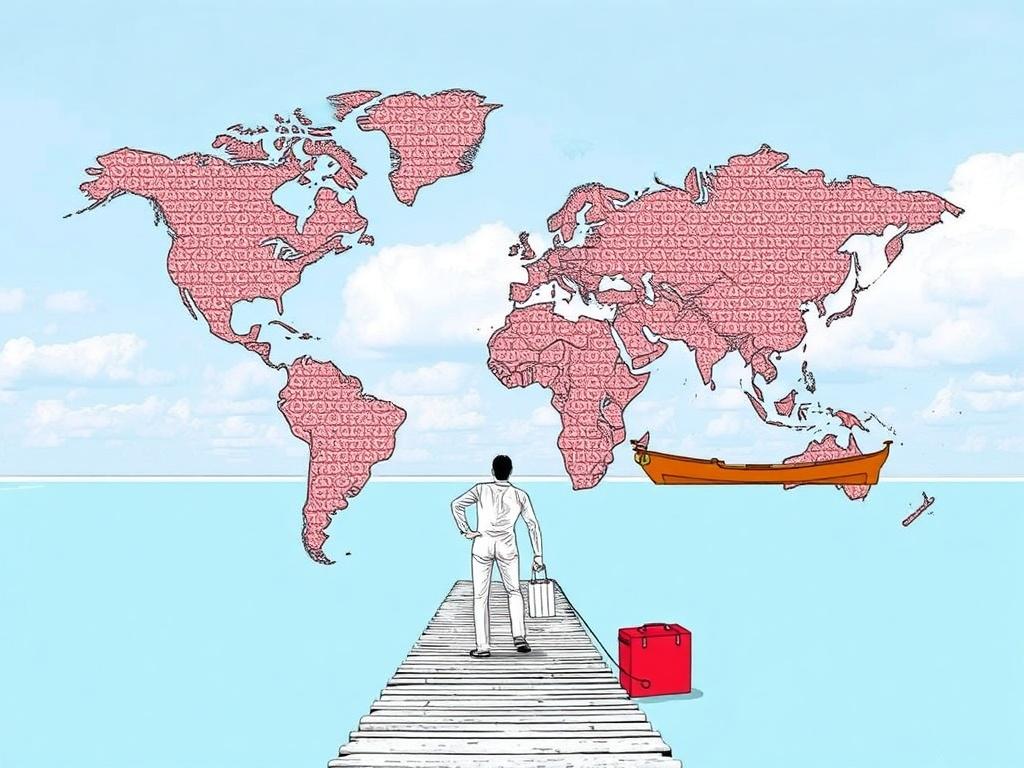
How to Handle Travel Emergencies: Staying Calm and Prepared Anywhere You Go
Traveling opens up a world of excitement, discovery, and new experiences, but it also comes with unexpected challenges that can sometimes turn your adventure into a stressful situation. Handling travel emergencies is a skill every traveler should master. Whether you’re dealing with lost passports, missed flights, medical issues, or natural disasters, staying calm and prepared can make all the difference. In this article, we’ll explore practical approaches and helpful tips on how to handle travel emergencies effectively, so your journey remains as smooth as possible even when things don’t go as planned.
Understanding the Most Common Travel Emergencies
When it comes to travel emergencies, knowing the types of situations you might face is the first step in managing them effectively. Emergencies on the road come in various forms, and being aware can help you prepare better. Here are some common travel emergencies every traveler should be aware of:
- Lost or stolen passport and important documents
- Medical emergencies such as sudden illness or injury
- Missed flights, cancellations, or delays
- Natural disasters like earthquakes, floods, or hurricanes
- Theft or loss of personal belongings
- Getting lost or stranded in unfamiliar places
Each of these scenarios requires a different response, but having a proactive mindset can turn these stressful moments into manageable challenges.
Before You Go: Preparing for Travel Emergencies
Preparation is the best defense against any travel emergency. While we can’t predict everything, there are concrete steps you can take to minimize risks and feel more confident when facing unexpected difficulties. Here’s a handy checklist to prepare for potential travel emergencies:
| Preparation Step | Details | Why It Matters |
|---|---|---|
| Make Copies of Important Documents | Scan and print passports, ID cards, travel insurance, visas, and emergency contacts | In case originals are lost or stolen, copies can help speed up recovery or identification |
| Purchase Travel Insurance | Choose a policy that covers medical emergencies, trip cancellations, and lost luggage | Provides financial protection and access to support services when things go wrong |
| Research Local Emergency Numbers | Know how to contact police, ambulance, embassy, and local help desks in your destination | Quick access can save precious time in critical moments |
| Register with Your Embassy | Sign up with your home country’s embassy or consulate for alerts and assistance | Assists with communication and evacuation during natural disasters or political unrest |
| Pack a Basic Emergency Kit | Include first aid supplies, medications, portable phone charger, and some cash | Useful for minor medical issues and unexpected delays or power outages |
Staying one step ahead by preparing for travel emergencies sets a strong foundation for a safer trip. It also boosts your peace of mind, allowing you to enjoy your journey more fully.
What to Do When You Lose Your Passport or Important Documents
One of the most stressful travel emergencies is losing your passport or other essential documents. Without proper identification, your trip can come to an abrupt halt. If this happens, follow these steps calmly:
- Report the Loss Immediately: Contact the local police to file a report. This documentation is often required for passport replacement and insurance claims.
- Contact Your Embassy or Consulate: Reach out to your country’s embassy or consulate as soon as possible. They can issue emergency travel documents or help with the repatriation process.
- Use Copies to Prove Your Identity: Having scanned copies or photocopies of your passport can help speed up the process of verification and issuance of emergency paperwork.
- Notify Your Airline and Hotel: Inform them of your situation to avoid misunderstandings and to check possible assistance options.
- Be Patient and Stay Calm: While waiting for replacement documents, maintain communication with authorities and follow their guidance.
Having your passport stolen or lost can feel overwhelming, but by following these steps and keeping a level head, you can navigate this emergency more smoothly.
Managing Medical Emergencies While Traveling
A medical emergency far from home can be scary. From mild illnesses to serious injuries, knowing how to handle medical issues on the road is vital. Here are some key tips for managing travel-related health emergencies:
Carry Essential Medications and Health Information
Before traveling, pack all necessary medications and keep a list of your prescriptions, allergies, and chronic conditions. This can be invaluable to doctors if you seek medical help abroad.
Find Reliable Medical Facilities
Research healthcare options at your destination. Many major tourist areas have hospitals with English-speaking staff, but it’s good practice to know their addresses and contact numbers before any emergency arises.
Utilize Travel Insurance and Medical Assistance Services
If you have travel insurance, call the 24/7 assistance line as soon as a medical emergency happens. They can guide you to the closest approved medical centers and help manage payments.
Follow Local Protocols and Stay Safe
Sometimes emergency services may vary in efficiency and availability depending on the region you are in. Be ready to seek help through hotels, tour guides, or local authorities if needed.
Dealing with Missed Flights and Travel Delays
Missed flights and delays are among the most frequent travel emergencies, caused by everything from bad weather to technical issues. When your travel plans take a hit, here’s what to do:
- Contact Your Airline Immediately: Speak with airline representatives either at the airport counter or via phone/app to understand your options.
- Know Your Passenger Rights: Airlines often offer rebooking, refunds, or compensation under certain conditions. Being informed helps you assert your rights.
- Check Travel Insurance Coverage: Some policies cover additional expenses like accommodation and meals during long delays or trip interruption.
- Arrange Alternative Transportation if Necessary: Consider trains, buses, or car rentals as backup options when flights are not available.
- Stay Calm and Flexible: Delays disrupt plans but keeping a positive mindset allows you to find solutions more easily.
Patience and quick action make handling missed flights less stressful, enabling you to get back on track promptly.
How to Respond During Natural Disasters While Traveling
Natural disasters such as earthquakes, hurricanes, or floods can strike without warning and create serious travel emergencies. Being prepared and knowing how to react can save lives:
Stay Informed and Alert
Monitor local weather reports and advisories before and during your trip. Mobile apps and embassy alerts can provide real-time updates.
Know Evacuation Routes and Emergency Shelters
Familiarize yourself with escape routes and safe places near your accommodation so you can evacuate quickly if necessary.
Follow Instructions From Officials
Listen carefully to police, emergency responders, or hotel staff, and follow their instructions without hesitation.
Keep Emergency Supplies Handy
Having bottled water, snacks, a flashlight, and basic medical supplies accessible can make a big difference if utilities or services are disrupted.
Maintain Communication
Try to keep phone lines free for emergency calls and let family or friends know you are safe as soon as possible.
Tips for Preventing Theft and Loss of Personal Belongings
Losing valuables such as wallets, cameras, or phones is an unfortunate travel emergency that can ruin your trip. Taking preventive measures can reduce the chance of theft or loss:
| Preventive Tip | Description | Benefit |
|---|---|---|
| Use Anti-Theft Bags and Wallets | Bags with lockable zippers, slash-resistant straps, and RFID protection deter thieves | Secure belongings and protect against electronic pickpocketing |
| Keep Valuables Close | Carry wallets and phones in front pockets or inside zipped compartments, not back pockets | Less accessible to pickpockets in crowded places |
| Limit What You Carry | Take only necessary IDs, cash, and cards; leave extra credit cards at the hotel safe | Reduces loss impact if theft occurs |
| Be Vigilant in Crowded Areas | Keep an eye on your belongings, especially on public transport, markets, and tourist hotspots | Decreases opportunity for theft |
| Use Technology | Enable phone tracking apps and back up important files to the cloud | Helps recover lost devices or wipe data remotely to prevent misuse |
Preventing theft and loss of belongings is easier than dealing with the consequences, so practice these tips during your travels to safeguard your valuables.
What to Do If You Get Lost or Stranded in an Unfamiliar Place
Finding yourself lost or stranded in a foreign city or rural area can feel intimidating, but staying calm and following some basic steps will help you find your way back safely:
- Stay Put and Assess Your Surroundings: If you’re truly disoriented, staying in one spot increases the chances of being found and prevents further wandering.
- Use Technology to Navigate: Use your smartphone’s GPS, map apps, or offline navigation tools to find routes or landmarks.
- Ask for Help From Locals: Approach trusted individuals such as shopkeepers, police officers, or hotel staff for directions or assistance.
- Contact Someone You Know: Call a friend, family member, or your hotel to explain your situation and ask for help.
- Keep Emergency Numbers Handy: Use local emergency contacts or your embassy if you feel unsafe or need official assistance.
Maintaining your composure, using available resources, and not hesitating to ask for help will get you through these situations safely.
Travel Emergency Contacts You Should Keep Accessible
Having important phone numbers and contacts easy to reach is critical in any emergency. Here’s a list you should save in your phone and keep printed copies of while traveling:
| Contact | Purpose | Why You Need It |
|---|---|---|
| Local Emergency Services | Police, Fire, and Ambulance | Immediate assistance in accidents, health crises, or crime |
| Your Country’s Embassy/Consulate | Travel Documents and Legal Help | Support with lost passports, legal trouble, and evacuation |
| Travel Insurance Assistance | Medical and Travel Emergency Support | Coordination of medical services and claims |
| Local Taxi or Transport | Safe Transportation | Reliable travel to and from critical locations |
| Accommodation Contact | Hotel or Host Details | Quick access to a safe place and assistance |
Saving these numbers before departure will prepare you to respond quickly if a travel emergency occurs.
Conclusion
Travel emergencies can happen to anyone, at any time, but with the right knowledge and preparation, you can handle them confidently and reduce their impact. From securing your documents and packing an emergency kit to knowing who to call and how to respond to different situations, learning how to handle travel emergencies transforms potential disasters into manageable experiences. Remember, the key is to remain calm, think clearly, and act swiftly. By equipping yourself with these strategies and maintaining a flexible, positive attitude, your travels will be safer and more enjoyable no matter the unexpected challenges you might face. Traveling is about embracing adventure, but it’s also about being smart and prepared—so your journey stays safe, memorable, and full of joy.




